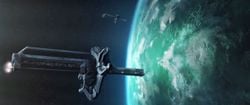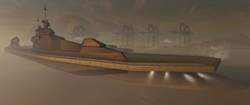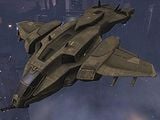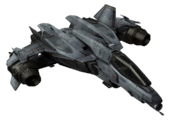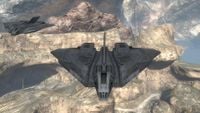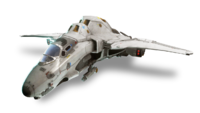UNSC Air Force: Difference between revisions
From Halopedia, the Halo wiki
BaconShelf (talk | contribs) m (→Aircraft) |
BaconShelf (talk | contribs) |
||
| Line 22: | Line 22: | ||
The official mission of the UNSC Air Force is to maintain aerospace superiority over the [[Human colonies|worlds]] of the [[Unified Earth Government]], as well as conduct space control [[operation]]s. In this capacity, the Air Force is responsible for organizing, training, and equipping air and space forces to interdict and destroy enemy attacks before and after they enter a world's orbit.{{Ref/Reuse|osfm136}}{{Ref/Book|Enc22|Page=52}} The Air Force's collateral functions include: | The official mission of the UNSC Air Force is to maintain aerospace superiority over the [[Human colonies|worlds]] of the [[Unified Earth Government]], as well as conduct space control [[operation]]s. In this capacity, the Air Force is responsible for organizing, training, and equipping air and space forces to interdict and destroy enemy attacks before and after they enter a world's orbit.{{Ref/Reuse|osfm136}}{{Ref/Book|Enc22|Page=52}} The Air Force's collateral functions include: | ||
*Deployment and maintenance UNSC unmanned defense satellites and [[orbital defense platform]]s.{{Ref/Reuse|osfm136}} | *Deployment and maintenance of UNSC unmanned defense satellites and [[orbital defense platform]]s.{{Ref/Reuse|osfm136}} | ||
*Monitoring and regulating military and [[civilian]] orbital activities.{{Ref/Reuse|osfm136}} | *Monitoring and regulating military and [[civilian]] orbital activities.{{Ref/Reuse|osfm136}} | ||
*Development of doctrine, procedures, and equipment that are of common interest to the [[UNSC Army|Army]] and [[UNSC Navy|Navy]].{{Ref/Reuse|osfm136}} | *Development of doctrine, procedures, and equipment that are of common interest to the [[UNSC Army|Army]] and [[UNSC Navy|Navy]].{{Ref/Reuse|osfm136}} | ||
Revision as of 10:40, January 8, 2024
| UNSC Air Force | |
|---|---|
 The logo of the Air Force | |
|
Founded: |
|
|
Affiliation: |
|
|
Branch: |
|
|
Type: |
Aerospace force[2] |
|
Role: |
Atmospheric operations and orbital defense[2] |
|
Engagements: |
|
|
Commanders: |
|
The UNSC Air Force is the aerospace warfare service branch of the United Nations Space Command responsible for atmospheric operations and orbital defense.[2][5] The Air Force maintains numerous orbital defense satellites, automated drone fleets, and manned aerospace interceptors to defend human space, often working closely with the UNSC Navy and Army.[2][6]
Mission and roles
- "Provide aerospace defense and conduct space control operations."
- — The official mission statement of the UNSC Air Force[2]
The official mission of the UNSC Air Force is to maintain aerospace superiority over the worlds of the Unified Earth Government, as well as conduct space control operations. In this capacity, the Air Force is responsible for organizing, training, and equipping air and space forces to interdict and destroy enemy attacks before and after they enter a world's orbit.[2][7] The Air Force's collateral functions include:
- Deployment and maintenance of UNSC unmanned defense satellites and orbital defense platforms.[2]
- Monitoring and regulating military and civilian orbital activities.[2]
- Development of doctrine, procedures, and equipment that are of common interest to the Army and Navy.[2]
- Furnishing launch and space support for the Army and Navy.[2]
The Air Force's orbital defense satellites and aerospace interceptors are among the first lines of defense for a colony. The Air Force's vigilance is crucial to a world's defense, ensuring that threats are detected early and either eliminated or delayed so reinforcements may be requested. The Air Force operates a network of quick reaction squadrons on Earth and the Inner Colonies, which are prepped and ready to deploy with atmospheric fighters and military spaceplanes at the first sign of an attack. These fighters operate in chorus with orbiting surveillance and weapons satellites to delay and attrition attacks, while supporting available Navy fleet assets. The Air Force takes the defense of in orbit and near orbit territory solemnly, operating both manned and unmanned fighters and drones.[2][6]
Other duties of the Air Force include maintaining security forces for airbase and spaceport defense.[8][9] The Air Force also provides search and rescue support.[3][10]
History
The UNSC Air Force was formed as one of the four service branches of the United Nations Space Command armed forces in December 2163.[1] The Air Force participated in the Insurrection.[3]
During the Human-Covenant War, the Air Force maintained strong lines of defense on Earth and the Inner Colonies, amassing an impressive kill ratio against invading Covenant forces despite their substantial technological and numerical disadvantage.[2] The human Outer Colony of Meridian was home to an impressive UNSC Air Force garrison and orbital defense grid. When the colony was attacked by the Covenant in 2548, the Air Force aided in Meridian's defense, leading to an extended battle lasting three years.[11] The Air Force was present during the Fall of Reach, where their D77-TC Pelican dropships provided transport and close air support to UNSC Army and Marine forces. Additionally, Air Force Longsword interceptors provided air support for ground forces.[12] The Air Force would later participate in the Battle for Earth, notably engaging in an operation with Marine forces to destroy Skar'wa-pattern Mantis emplacements near Voi, allowing Battle Group Victory to assault the High Prophet of Truth's Forerunner Dreadnought.[13][14]
In February 2558, the Air Force was involved in the Requiem Campaign alongside other UNSC forces.[15]
Organization
Administration and structure
The UNSC Air Force is one of the five service branches of the United Nations Space Command's armed forces,[1] subordinate to UNSC High Command. The senior officer of the Air Force holds a seat on the UNSC Security Council, the senior leadership cabinet of the Armed Forces.[16] The current senior officer is General R. Dellert.[4] The Air Force is structured under the Unified Ground Command (UNICOM), which coordinates the Armed Force's terrestrial and close-orbit missions.[16]
Within the Air Force are a number of major commands tasked with different administrative and operational roles. Among these are the Air Combat Command, which is tasked with gaining air superiority and providing support for ground forces, and the Air Mobility Command, which contains Air Mobility Express, assigned to airlift materiél and personnel during wartime.[17][18] The Air Force's orbital defense platforms fall under the jurisdiction of the Orbital Defense Command.[19] The UNSC Air Force also maintains a signals intelligence (SIGINT) division.[20]
At the deployment level, Air Force units are deployed as flights consisting of 3-4 aircraft, with between two and six flights (plus their relevant command and technical support) comprising a squadron.[6] Depending on deployment type, multiple squadrons are assigned to a larger organisation known as a Wing or a Group (expeditionary and garrison deployments, respectively) alongside other non-aircraft units to provide specialised services such as airbase operation or fuel refining.[6]
- Known Air Force units
Relationship with other branches
The UNSC Air Force supports other service branches of the UNSC Armed Forces by ensuring air superiority, as well as providing other branches with special transport capabilities, supply drops behind enemy lines, and close air support against entrenched enemy positions. The Air Force works closely with the UNSC Navy and UNSC Army, supplying both service branches with launch and space support. The Air Force works to develop doctrine, procedures, and equipment that are of common interest to the Army and Navy, as the other two branches do for the Air Force. The Air Force commonly supports the Navy in fleet engagements, providing close orbit fighter support. The UNSC Marine Corps is further responsible for the organizing, training, and equipment of airborne and space combined-arms teams capable of rapid deployment by the Air Force.[2] During the war with the Covenant, the Air Force worked closely with the Army to deploy air assets from the Army's maritime carrier platforms, such as the Crassus-class supercarrier.[6][22]
The Air Force maintains a close relationship with the nascent Spartan Operations division, working closely with the Spartans in all major campaigns. The Air Force was the first service branch of the Armed Forces to directly collaborate with Spartan Operations, funding a joint-operations laboratory to test innovative ways in which Spartan supersoldiers can augment their existing capabilities, as well as certifying Spartans to operate the Air Force's latest-generation strike fighters.[2]
Personnel
Large numbers of airmen serve in the UNSC Air Force. The bulk of the UNSC's pilots serve in the Air Force, fulfilling crucial roles operating aircraft and spacecraft. Pilots are relatively lightly armored with fatigues with teal-toned camouflage and white chest armor geared for long-flight mobility. On missions in a vacuum, the suit can be sealed off and an enclosed standard combat helmet is worn with it.[23] Each suit features extra-vehicular activity integration for exoatmospheric operations that are associated with a given dropship deployment.[23]
The ranks of Air Force personnel are divided into enlisted airmen, non-commissioned officers, and commissioned officers. Along with Spartan Operations, the Air Force is one of the only service branches of the Armed Forces that does not select or utilize warrant officers.[24]
Enlisted ranks
| Rank code | E-1 | E-2 | E-3 | E-4 | E-5 | E-6 | E-7 | E-8 | E-9 | ||||
| Rank | Private (PVT) | Private, First Class (PFC) | Lance Corporal (LCPL) | Corporal (CPL) | Sergeant (SGT) | Staff Sergeant (SSGT) | Gunnery Sergeant (GYSGT)[unicomnote 1] |
|
| ||||
| Typical responsibilities | Boot camp and training school | Initial assignment | Fireteam assistant | Fireteam leader | Squad leader | Assistant platoon leader | Assistant company commander |
|
|
Officer ranks
| Rank code | OT | WO-1 | WO-2 | O-1 | O-2 | O-3 | O-4 | O-5 | O-6 | O-7 | O-8 | O-9 | O-10 |
| Rank | Cadet (CDT) | Warrant Officer (WO) | Chief Warrant Officer (WO-2) | Second Lieutenant (2LT) | First Lieutenant (1LT) | Captain (CPT) | Major (MAJ) | Lieutenant Colonel (LTCOL) | Colonel (COL) | Brigadier General (BGEN) | Major General (MGEN) | Lieutenant General (LTGEN) | General (GEN) |
| Typical responsibilities | No command authority | Crew chief or Army pilot | Senior subject matter expert | Platoon commander | Company executive officer | Company commander | Battalion executive officer | Battalion commander | Brigade commander | Division commander | Task Force commander | CENTCOM commander | HIGHCOM senior staff |
Notes
Equipment
Infantry
The UNSC Air Force maintains an inventory of small arms and other infantry weapons and shares some resources with the UNSC Army. The M392 DMR was used for medium-range suppression, commonly employed by the Air Force's combat rescue teams during the Insurrection and Human-Covenant War. However, after 2548, the DMR would be replaced with the BR55 series.[3][25] while the M6H magnum became the standard personal sidearm of the Air Force as of 2555.[26]
The Air Force operates several vehicles for security patrols, including the M290 Mongoose, specifically the Urban variant.[8]
Aircraft
The Air Force operates a wide variety of aircraft. The D77-TC Pelican dropship is used primarily for the pickup and transportation of personnel, vehicles, and equipment, but also has significant offensive capabilities. The Pelican is capable of carrying numerous armament configurations, including Scorpion anti-tank missiles, Anvil II air-to-surface missiles, as well as a chin-mounted 20mm autocannon. The Air Force also operates EV-44 Nightingales, a medical and maintenance support aircraft utilized by Air Force rescue squadrons.[10]
The UNSC Air Force operates a number of space fighters, the most common of which is the C712 variant of the GA-TL1 Longsword.[27][28] The Longsword is a multi-role fighter that can be used in a variety of missions, including ground support, anti-ship attacks, and combat with other fighters.[29] The Air Force also maintains the FSS-1000 Sabre as a space superiority fighter. This aircraft possesses powerful energy shielding technology, and is designed for the dual purposes of peak acceleration and maneuverability in orbital combat. In addition to the Sabre, the Air Force also fielded the F-41 Broadsword throughout the Human-Covenant War and the post-war conflicts. Following the Covenant War, the remaining B-65 Shortsword suborbital bomber inventory was transferred to the Air Force Reserve or scrapped, depending on their condition.[27][6][28]
The Air Force operated the F-23 Falcata V/STOL fighter at the outset of the Human-Covenant War, though it was eventually replaced by the S-14 Baselard.[30] Following the conclusion of the Human-Covenant War, the branch tentatively approved a program to begin replacing the aging Baselards with the newer S-930 Pegasus strike fighter - intending for all such replacements to be complete by the year 2570. However, the onset of the Created crisis has temporarily halted such plans.[31]
The majority of the Air Force's atmospheric forces are comprised of unmanned combat air vehicles, such as the F-99 Wombat. Such drones are expendable and can be deployed in large numbers very quickly.[2]
Production notes
In an interview, Frank O'Connor confirmed the existence of an Air Force as a branch of the United Nations Space Command armed forces, specifically the UNSC Defense Force along with the UNSC Army.[5]
Gallery
The FSS-1000 Sabre, an experimental Air Force starfighter.
An atmospheric variant of the GA-TL1 Longsword, the UNSC's primary combat fighter.
The F-41 Broadsword, the UNSC's postwar space superiority fighter.
List of appearances
- Halo 3 (First appearance)
- Halo: Reach
- Halo: Combat Evolved Anniversary (Mentioned only)
- Halo 4
- Halo: Escalation
- Halo: Mortal Dictata (Mentioned only)
- Halo: Fleet Battles (Mentioned only)
- Halo 5: Guardians (Mentioned only)
- Halo Wars 2 (Mentioned only)
- Halo: Official Spartan Field Manual
- Halo: Battle Born (Mentioned only)
Sources
- ^ a b c d e Halo Waypoint, UNSC (Retrieved on Apr 30, 2021) [archive]
- ^ a b c d e f g h i j k l m n o p q Halo: Official Spartan Field Manual, chapter 136-138
- ^ a b c d Halo Waypoint, DMR (Retrieved on Aug 30, 2021) [archive]
- ^ a b Halo: Escalation, issue 8
- ^ a b halo.bungie.org, Interview with Frank O'Connor and Robert McLees (Retrieved on Jun 18, 2023) [archive]
- ^ a b c d e f g Halo Encyclopedia (2022 edition), page 60
- ^ Halo Encyclopedia (2022 edition), page 52
- ^ a b Halo 5: Guardians, REQ card: Urban Mongoose decription "Rugged utility vehicle used by UNSC Army scouts and Air Force security patrols. Improved Mongoose with upgraded armor."
- ^ Halo Waypoint, Jordan Gaines (Retrieved on Aug 2, 2021) [archive]
- ^ a b Halo Wars 2, Phoenix Logs: Nightingale
- ^ Halo Waypoint, Meridian (Retrieved on Jul 31, 2021) [archive]
- ^ Halo: Reach, campaign level Tip of the Spear
- ^ Halo Legendary Crate, Data Drop #2
- ^ Halo 3, campaign level The Storm
- ^ Halo 4 - Spartan Ops, episode Departure, level Land Grab
- ^ a b Halo: Official Spartan Field Manual, page 120-122
- ^ Halo: Reach, AMX-42 in-game decal
- ^ The Free Dictionary, AMX (Retrieved on Jul 20, 2023) [archive]
- ^ Halo 4, campaign level Midnight
- ^ Halo: Official Spartan Field Manual, page 113
- ^ Halo Infinite, multiplayer map Launch Site
- ^ Halo Waypoint, Canon Fodder - Ship Strike (Retrieved on Apr 20, 2023) [archive]
- ^ a b Halo Encyclopedia (2011 edition), page 57
- ^ Halo: Official Spartan Field Manual, page 139-143
- ^ Halo: The Essential Visual Guide, page 21
- ^ Halo Waypoint, Magnum (Retrieved on Aug 29, 2021) [archive]
- ^ a b Halo Waypoint, Canon Fodder - Feet First (Retrieved on Jan 16, 2016) [archive]
- ^ a b Halo Encyclopedia (2022 edition), page 161
- ^ Halo: The Essential Visual Guide, chapter 112
- ^ Halo Waypoint, Canon Fodder - Fictional Festivities (Retrieved on Dec 20, 2023) [archive]
- ^ Halo Waypoint, Canon Fodder - Digsite Dissection (Retrieved on Jul 31, 2023) [archive]
